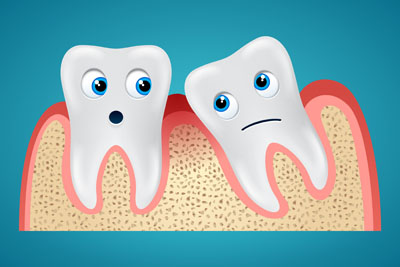 Periodontics care is necessary for treating gum disease, a serious condition that can lead to tooth loss. Anyone who has signs of gum disease needs to visit our office right away for an examination and treatment. Otherwise, there is a risk that the condition will escalate and lead to tooth loss.
Periodontics care is necessary for treating gum disease, a serious condition that can lead to tooth loss. Anyone who has signs of gum disease needs to visit our office right away for an examination and treatment. Otherwise, there is a risk that the condition will escalate and lead to tooth loss.
What is gum disease?
Gum disease is a condition that irritates and inflames the gums first. The gums can then swell, bleed and begin to recede or pull away from the structure of the tooth, exposing the roots in the process.
How does it develop?
Typically, gum disease forms because plaque and tartar build up around the structure of the tooth beneath the gums. It is nearly impossible to reach this area in order to brush the plaque away. This creates a problem while the gums continue to be irritated by the plaque without an end in sight.
Thus, it is critical to visit our clinic so that we can remove the plaque and tartar. Additionally, some people are at greater risk for gum disease. This includes diabetics and pregnant women since blood flow to the gum tissue can be reduced or limited.
How can periodontics treat gum disease?
The first step in treating gum disease is to remove the plaque and tartar that is irritating the gums. We can do this with a deep cleaning in our office. We can reach areas that one cannot reach at home, making it possible to remove all of the plaque and tartar. If we treat gum disease in its earliest stage, it may be enough to solve the problem. At this stage, the gums will begin to return to good health without further intervention.
However, if the gum disease escalates to the point that the gums begin to recede, then more intensive treatment is necessary. Gum disease can create pockets in the gum tissue where more invasive intervention is the only method to treat it. This could even include oral surgery and a gum grafting procedure. If necessary, it is important to have the procedure because failing to do so will lead to significant irritation, pain, and even tooth loss. Since many dentists do not perform this level of treatment, it is necessary to seek out a periodontics office.
Risk vs. reward
Leaving gum disease untreated poses a significant risk. Primarily, that of tooth loss. Losing teeth to gum disease when it can be prevented is an unnecessary health risk and creates far more cost than treating the condition early on. After all, once teeth have been lost, they will need to be replaced with either dentures or dental implants.
Even so, gum disease will need to be treated so it is best to just treat it immediately.
Schedule an appointment for periodontics care
Get the help you need to restore your gums to good condition. It is important to schedule an appointment as quickly as possible to ensure that gums can return to good health without the risk of tooth loss. We invite you to visit our office right away so that we can examine you and make the appropriate treatment recommendations.
Related Posts
The Impact of Periodontal Disease on Your Oral Health: What You Need to Know
Periodontal disease is a result of severe bacterial infection in the gum tissue. It causes many problems in the mouth. Knowing the impact of gum infection on your oral health can motivate …
When a Periodontist Evaluates the Health of Gums
When it comes to gum health, a periodontist is the right professional to see. Healthy gums are an integral part of your oral health and overall wellness. If you fail to take …
Gum Disease Prevention Tips from a Periodontist
A periodontist is a dentist who focuses on diagnosing and treating serious gum issues such as periodontitis. Also known as gum disease, this condition is preventable with some basic steps and good …
An Implant Periodontist Shares the Steps of Replacing Missing Teeth With Dental Implants
When missing or damaged teeth need to be replaced, a visit to an implant periodontist can restore uniformity and function in the mouth through dental implants. The process of replacing missing teeth …
